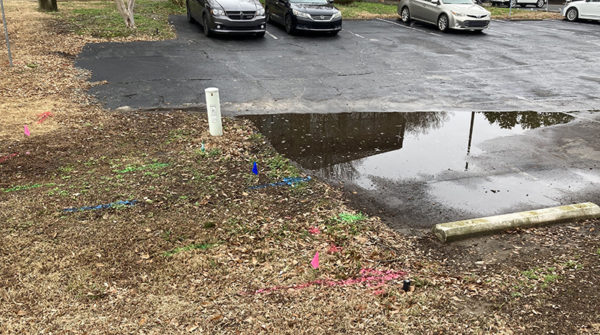Stormwater projects begin at WCC

Sediment build-up from poor drainage has led to grass occupying parking spaces in a parking lot at Wayne Community College.
GOLDSBORO — Wayne Community College is getting a stormwater makeover, thanks to Sound Rivers’ Program Director Clay Barber and a 2020 Environmental Enhancement Grant.
Barber has been eyeing the bio-swale project since 2019, and this week set the project in motion, meeting with Simon Greg, an engineer with Kris Bass engineering, and Gabe Adams, project manager for Backwater Environmental.
“A bio-swale (or water-quality swale) encourages treatment of stormwater runoff by spreading the water out and allowing it to fill up a little bit more, so that more water can soak into the ground before heading into the underground pipe network,” Barber said.
Swales are shallow channels with gently sloping sides and are one of the most commonly used stormwater practices. They not only convey stormwater but also help to treat runoff to reduce pollutants.
The WCC bio-swale is 1,700 linear square feet, running parallel to one of the main roadways on campus and draining a parking lot at one end. Because the existing swale hasn’t been draining properly, sediment build-up has made several parking spaces unusable and blocked curb cut-outs meant for the road’s runoff.
“They’re going to dig out the existing swale and widen it and add amended soil to the length of swale — soil that will allow filtration,” Barber said. “The main goal is to treat the water, but the added benefits are it’s going to reduce flooding of the parking lot and reduce erosion.”
Backwater Environmental, based out of Eden, previously worked with Sound Rivers to restore a swale at Nash Community College, as well as Nash’s recently completed rain gardens, and the constructed wetlands at Beaufort County Community College and Havelock High School.
The bio-swale is the first of two projects at WCC — a rainwater harvesting cistern will also be installed at the school’s Ash Building. Work on the bio-swale begins next week and should be completed in three weeks.
“We’re excited to get going since it’s been a while in the making. We’re going to create cleaner water, make some parking spaces useable again, improve the aesthetics of a very high traffic area and make maintenance easier,” Barber said.
— From the Wayne Community College website



